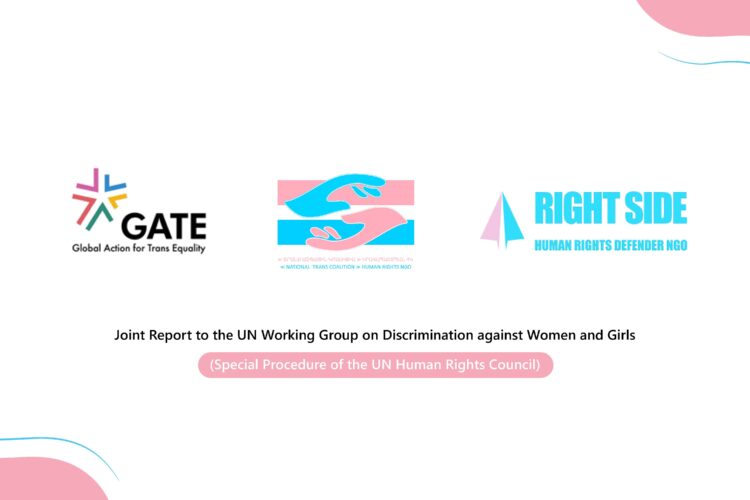In 2025, National Trans Coalition (NTC) and Right Side Human Rights Defender NGO (RS) jointly submitted a report to the UN Working Group on Discrimination against Women and Girls, within the Special Procedure of the UN Human Rights Council, addressing systemic discrimination against trans women and gender diverse people in Armenia.
Summary
Trans women and gender diverse people in Armenia continue to face systemic, layered discrimination in law, policy, and practice. Here are some of the key issues our communities are facing in Armenia:
1. Legal gender recognition
Armenia lacks a clear and accessible procedure for legal gender recognition. In practice, changes to identity documents are only possible after gender-affirming surgery – a requirement not mandated by law but enforced de facto by authorities. This violates international human rights standards, excluding trans people from education, employment, and social services.
2. Absence of comprehensive anti-discrimination and hate crime laws
Despite constitutional equality guarantees, Armenia has no specific legislation protecting against discrimination based on sexual orientation or gender identity. Trans women frequently experience hate speech, denial of services, and violence, often met with police inaction or bias.
3. Lack of gender-affirming healthcare
Gender-affirming healthcare is virtually unavailable. There are no trained specialists, no access to hormonal therapy through the public system, and no surgeries performed domestically. Many trans people rely on informal sources or travel abroad for treatment, facing stigma and violations of confidentiality from healthcare providers.
4. Violence, threats, and impunity
The organizations collected data on personal experiences of trans women and gender diverse people in Armenia and found that:
- 68% of survey participants reported experiencing violence due to their gender identity.
- 52% faced family violence or confinement.
- Many reported transphobic treatment and mockery by police itself.
5. Socioeconomic exclusion and intersectional discrimination
In the same line with the results presented above, they found that:
- 92% of respondents mentioned that document mismatches caused daily discrimination.
- 67% faced job rejections or pressure to hide their identity when applying for jobs.
- Trans sex workers reported violence from both clients and law enforcement authorities.
- Trans women living with HIV faced stigma and denial of healthcare.
- Many reported difficulties in renting a house or accessing services due to gender marker discrepancies.
Recommendations to the Government of Armenia
In order to eliminate these gaps and effectively protect and advance the rights of trans and gender diverse people in Armenia, both organizations have submitted several recommendations to the Armenia State. Some of the recommendations are highlighted below:
Legal Gender Recognition
- Develop and adopt a clear and transparent legal framework for legal gender recognition based on the principle of self-determination.
- Remove any medical requirement, including gender-affirming surgery, hormone replacement therapy, psychiatric reports, etc. as a prerequisite for legal gender recognition.
Prevention of Gender-Based Violence and Protection
- Adopt comprehensive anti-discrimination legislation that explicitly includes gender identity and sexual orientation.
- Ratify and implement the Istanbul Convention.
Healthcare
- Establish and fund trans-competent healthcare services, including hormonal therapy and psychological support.
- Adopt and implement ICD-11 and eliminate the pathologization of trans identities.






